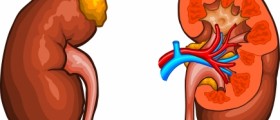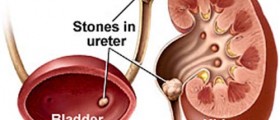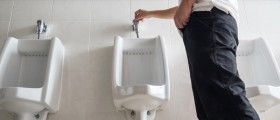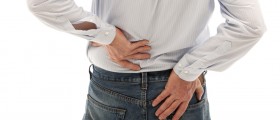
Kidney stones or renal calculi are a common disorder of the urinary tract. It is estimated that they affect 10% of all Americans at some point in their lives. They can affect anyone, but are commonly seen in men in their forties.
Kidney stones are basically small, hard crystal aggregations, formed from urinary minerals, most commonly calcium with oxalate or phosphate and uric acid.
Smaller kidney stones can be passed, through urination, sometimes without even knowing it. However, larger ones, which cannot pass, remain in the urinary tract, causing problems.
Causes of kidney stones in men
There are many possible causes for kidney stones in men. They range from urinary tract infections, certain medications, to lifestyle and dietary choices. Lack of physical activity, insufficient water intake and consumption of foods and beverages containing calcium oxalate, like milk, chocolate and tea can lead to the formation of kidney stones. Hereditary factors also play an important role.
Men are more prone to kidney stones than women, because their muscle mass is comparatively larger, with increased metabolic waste, which increases the risk of kidney stones. In addition, men have a more complicated urinary tract than women. Enlarged prostates may occur as they grow older, and it can affect the ability to empty the bladder completely. This can lead to formation of crystals and stones.
Symptoms of kidney stones in men
The main symptom of kidney stones in men is pain, called renal colic. The pain is usually located at one or both sides of the back, around the abdomen, sometimes in groins and genitals.
Other than the pain, the symptoms may include fever with chills and cold sweats, fatigue, nausea and vomiting and blood in urine.
Treatment for kidney stones in men
Treatment for kidney stones varies depending on their shape, size and number. Smaller kidney stones can be passed rather easily through urination, although it may involve some pain and discomfort. Exercise and proper hydration can accelerate the process of passing the stone.
Larger stones that cannot be passed require medical treatment. The most common treatment option for such stones is ESWL or extracorporeal shock wave lithotripsy. The stones are first located using X-ray or ultrasound imaging and then electric shocks are applied to break the stones into smaller ones which can be passed without difficulty.
Percutaneous nephrolithotomy is a surgical option for removing the kidney stones, especially very large ones.
The best way to prevent the formation and recurrence of kidney stones is to drink plenty of water and to exercise regularly, to avoid foods rich in calcium and protein and to increase the intake of potassium and magnesium.

















Your thoughts on this
Loading...